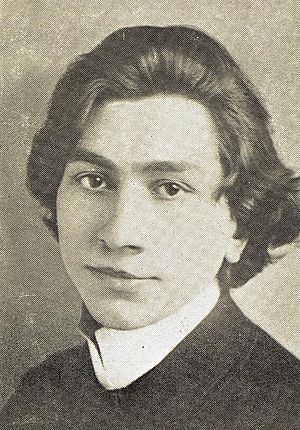Rudolf Friml facts for kids
Charles Rudolf Friml (born December 7, 1879 – died November 12, 1972) was a famous composer and pianist. He was born in Prague, which is now in the Czech Republic. Friml wrote many operettas, musicals, songs, and piano pieces.
After studying music and performing for a short time in Prague, Friml moved to the United States. There, he became a well-known composer. His most famous works are Rose-Marie and The Vagabond King. Both of these shows were very popular on Broadway in New York and in London. They were even made into movies.
Contents
Early Life and Moving to America
Rudolf Friml was born in Prague, which was then part of the Austro-Hungarian Empire. He showed a talent for music from a young age. In 1895, he started studying at the Prague Conservatory. He learned piano and composition from the famous composer Antonín Dvořák.
Friml was asked to leave the conservatory in 1901 because he performed without permission. In Prague and later in America, he wrote and published many songs and piano pieces. One of his early song sets, Písně Závišovy, even won an award.
After leaving the conservatory, Friml worked as a piano player for the violinist Jan Kubelík. He toured the United States with Kubelík twice. In 1906, Friml decided to move to America permanently.
His first job in New York was at the Metropolitan Opera. He also played the piano for the first time in America at Carnegie Hall. In 1904, he performed his own Piano Concerto there with the New York Symphony orchestra.
Friml married Mathilde Baruch in 1909. They had two children, Charles Rudolf Jr. and Marie Lucille. He married a few more times during his life.
First Big Shows: The Firefly and Other Operettas
In the early 1900s, operettas were very popular in America. An operetta is like a light opera with singing, acting, and dancing. The most famous operetta composer at that time was Victor Herbert.
In 1912, a famous singer named Emma Trentini was supposed to star in a new operetta by Victor Herbert called The Firefly. But Herbert and Trentini had a disagreement. Herbert refused to work with her anymore.
The show's producer, Arthur Hammerstein, needed a new composer quickly. He chose Friml, who was not very well known in theater at the time, because of his classical music training. Friml worked hard and created the music for The Firefly.
The Firefly opened in December 1912 and was a big success. It ran for 120 performances on Broadway. After The Firefly, Friml wrote three more successful operettas: High Jinks (1913), Katinka (1915), and You're in Love (1917). He also wrote songs for other musicals, like The Peasant Girl.
Becoming a Star Composer
Friml wrote his most famous operettas in the 1920s. In 1924, he created Rose-Marie. This show was a huge hit all over the world. Some songs from it, like "The Mounties" and "Indian Love Call", became very popular. Rose-Marie was special because it included a murder mystery in its plot, which was new for operettas at the time.
After Rose-Marie, Friml had two more big hits. These were The Vagabond King in 1925 and The Three Musketeers in 1928. The Three Musketeers was based on the famous adventure novel by Alexandre Dumas. Friml also wrote music for the Ziegfeld Follies shows in 1921 and 1923.
During the 1930s, Friml wrote music for many films. His operettas like The Vagabond King, Rose-Marie, and The Firefly were made into movies and featured his music. He also wrote a new operetta score for a film called The Lottery Bride in 1930.
However, as time went on, Friml's music became less popular on Broadway and in Hollywood. Some people thought his songs were too old-fashioned or overly emotional. His last stage musical was Music Hath Charms in 1934.
Later Years and Lasting Impact
Instead of trying to change his style, Friml decided to focus on playing the piano in concerts and writing classical music. He continued to do this into his nineties. He also composed music for the 1947 film Northwest Outpost.
Some of Friml's works have been performed again on Broadway. For example, The Vagabond King was revived in 1943, and The Three Musketeers in 1984. Songs like "The Donkey Serenade" (from the film version of The Firefly), "The Mounties", and "Indian Love Call" are still heard today. His piano music is also often played.
In 1967, Friml gave a special concert in San Francisco. He often started his concerts by playing music he made up on the spot. He also played his own songs and music by composers who inspired him, like his teacher Dvořák. He even appeared on Lawrence Welk's TV show in 1971. Friml was one of the first people to be honored in the Songwriter's Hall of Fame.
Both of Friml's sons also became musicians. Rudolf Jr. led a big band, and William was a composer in Hollywood. In 1969, the writer Ogden Nash celebrated Friml's 90th birthday with a poem. The poem suggested the world would be "Frimler" (happier) if it were more like his music.
Rudolf Friml passed away in Los Angeles in 1972. He was buried in the "Court of Honor" at Forest Lawn Memorial Park in Glendale, California. His last wife, Kay Wong Ling Friml, was buried with him in 2007.
Works
|
|
See also
 In Spanish: Rudolf Friml para niños
In Spanish: Rudolf Friml para niños
 | Aurelia Browder |
 | Nannie Helen Burroughs |
 | Michelle Alexander |



